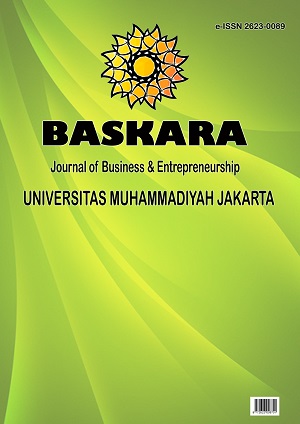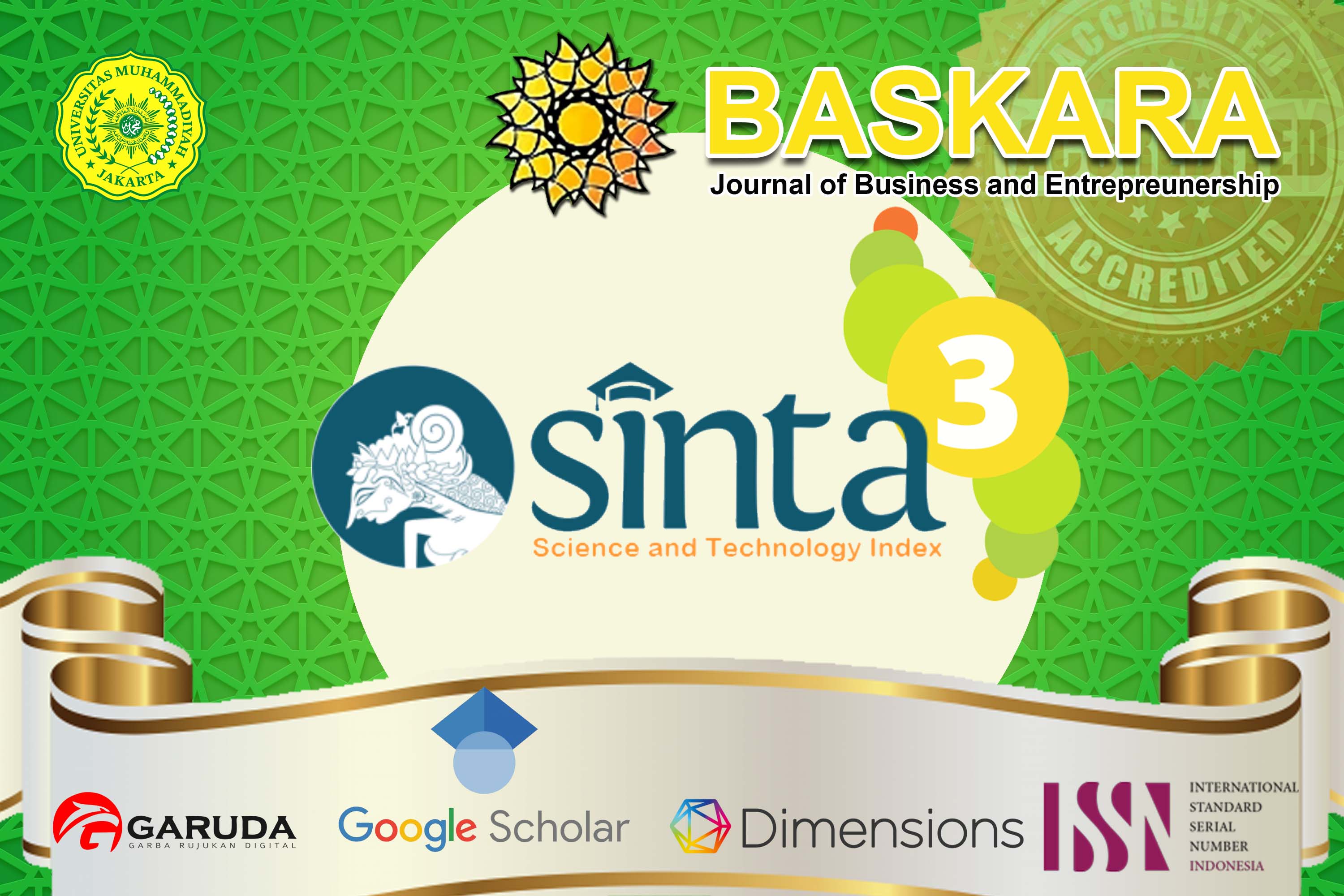From Villages to World Markets: Women and E-Commerce in East Sumba, East Nusa Tenggara
DOI:
https://doi.org/10.54268/baskara.v4i1.8950Kata Kunci:
Entrepreneurship, E-Commerce, Social MediaAbstrak
This paper focuses on the use of e-commerce by women weaving craftsmen, in Sumba, East Nusa Tenggara. In 2020, We Are Social noted that 56% of Indonesia's population are active internet users, including 29% of the population are active e-commerce users. The Indonesian Creative Economy Agency report states that 36% of e-commerce traders in Indonesia come from rural areas, especially in Java. Data shows that fashion and craft-based creative industries have a high contribution to the national economy, and for this reason, the government has taken several policies in fostering and developing the creative industry, one of which is by increasing the development of business groups that are under the creative industry, especially those based on fashion and regional crafts. Sumba is known as Pahikung weaving where most of the industrial craftsmen are women. Using the ethnographic method, by interviewing twelve women weaving craftsmen, this paper explains that the marketplace opens up opportunities for better weaving sales by cutting distribution channels so that their products can be directly accepted by consumers, and by promoting through social media, they cut indirect costs. However, there are three main obstacles faced: production costs, distribution, and access to financial services. With this mapping, it is hoped that it will encourage more accommodative policies towards women craftsmen in rural and remote areas in Indonesia.Referensi
Andari, R., Bakhshi, H., Hutton, W., O’Keeffe, A., & Schneider, P. (2017). Staying Ahead: The Economic Performance of the UK’s Creative Industries. The Work Foundation.
Aritenang, A. F., Iskandar, Z. S., & Safitri, P. (2020). Exploration of Creative Industry Networks: The Case of Binongjati Knitting Community. IOP Conference Series: Earth and Environmental Science, 592(1). https://doi.org/10.1088/1755-1315/592/1/012031
Badan Ekonomi Kreatif. (2019). The Indonesian Creative Economy Agency Report 2018.
Badan Ekonomi Kreatif. (2020). The Indonesian Creative Economy Agency Report 2019.
Cho, Y., Li, J., & Chaudhuri, S. (2020). Women Entrepreneurs in Asia: Eight Country Studies. Advances in Developing Human Resources, 22(2), 115–123.
Etim, E. S. (2020). The Utilization of Social Media Platforms for Viability of Female-owned Small and Medium-scale Enterprises in South Eastern Nigeria. Acta Universitatis Danubius, 16(1), 96–112.
Farhoomand, A., & Lovelock, P. (2019). Global E-commerce: Text & Cases. Prentice-Hall.
Fauzi, F., Antoni, D., & Suwarni, E. (2020). Women Entrepreneurship in The Developing Country: The Effects of Financial and Digital Literacy on SMEs’ Growth. Journal of Governance and Regulation, 9(4), 106–115.
Hongdiyanto, C., Teofilus, T., Sutrisno, T. F. C. W., & Dewanti, P. S. P. (2020). The Effect of Entrepreneurial Learning Towards Entrepreneurial Intention of Indonesian Women. Journal of Asian Finance, Economics and Business, 7(9), 573–582.
Khairunnisa, D. A., & Noer, K. U. (2020). Strategy for Empowering Poor Families through an Integrated Program to Increase the Role of Women towards Prosperous Healthy Families in Depok, West Java. 2(5). https://doi.org/10.4108/eai.5-11-2019.2292485
Muafi, Grabara, J., Sudiyarto, & Siswanti, Y. (2019). Business Strategy, Organizational Structure, Work Processes: Are The Alignment? Quality - Access to Success, 20, 399–404.
Noer, K. U., & Madewanti, N. L. G. (2020). Too Many Stages, Too Little Time : Bureaucratization and Impasse in the Social Safety Net Program in Indonesia. Jurnal Studi Pemerintahan, 11(3), 370–400.
Nurazizah, F., & Chumaidiyah, E. (2020). Business Design and Feasibility of Puru Kambera Muslim Fashion Offline Store Establishment. IOP Conference Series: Materials Science and Engineering, 1003.
Rambu Babang, R., & Rachmad Rinata, A. (2019). Strategi Komunikasi Pemasaran Sentra Tenun Prailiu dalam Meningkatkan Penjualan Kain Tenun Sumba Timur. Jurnal Komunikasi Nusantara, 1(2), 78–85. https://doi.org/10.33366/jkn.v1i2.24
Rufaidah, P. (2019). Entrepreneurial Orientation of SMEs in the Creative Fashion Industry. Journal for Global Business Advancement, 12(2), 254–275.
Setini, M., Yasa, N. N. K., Supartha, I. W. G., Giantari, I. G. A. K., & Rajiani, I. (2020). The Passway of Women Entrepreneurship: Starting from Social Capital with Open Innovation, through to Knowledge Sharing and Innovative Performance. Journal of Open Innovation: Technology, Market, and Complexity, 6(2). https://doi.org/10.3390/joitmc6020025
Setyowati, T., & Fadah, I. (2018). Differentiation Competitive Strategy in Winning SMEs Advantage at Creative Industry in Jember. International Journal of Scientific and Technology Research, 7(2), 165–179.
Sidharta, I., Sidik Priadana, M., & Affandi, A. (2019). Innovative Behavior: The Study of Intellectual Capital Effect on Creative Fashion Industry in Bandung, Indonesia. Problems and Perspectives in Management, 17(4), 404–415. https://doi.org/10.21511/ppm.17(4).2019.33
Suryadi, A., Budimansyah, D., Solehuddin, M., Shantini, Y., & Yunus, D. (2020). Microcredit Provision, Lifelong Learning, and Productivity of Poor Women in Indonesian Villages. Adult Education Quarterly, 70(4), 360–376.
Untari, R., & Sanjaya, R. (2020). Penggunaan e-Marketplace untuk Pengrajin Tenun Sumba. Jurnal Ecodemica, 4(1), 1–16.
We Are Social. (2020). Digital 2019: Global Digital Overview.
We Are Social. (2021). Digital 2020: Global Digital Overview.
Yee Ong, S. Y., Habidin, N. F., Salleh, M. I., & Fuzi, N. M. (2020). The Relationship Between Women’s Entrepreneurship Practice, ICT Adoption, and Business Performance in Malaysia and Indonesia. International Journal of Entrepreneurship and Small Business, 39(4), 548–563.
Yudhistiro, K., Nur, A., Putri, M., Teknologi, F., Universitas, I., & Malang, M. (2020). Perancangan Aplikasi Market Interface Industri. 2470–2475.
Zhou, H. Z., & Johnston, K. (2020). A Road to Empowerment : Social Media Usage by Women Entrepreneurs in China. European Conference on Innovation and Entrepreneurship, 889–893. https://doi.org/10.34190/EIE.20.128
##submission.downloads##
Diterbitkan
Terbitan
Bagian
Lisensi
In order for Baskara: Journal of Business and Entrepreneurship to publish and disseminate research articles, we need publishing rights (transfered from author(s) to publisher). This is determined by a publishing agreement between the Author(s) and Baskara Journal. This agreement deals with the transfer or license of the copyright of publishing to Baskara: Journal of Business and Entrepreneurship, while Authors still retain significant rights to use and share their own published articles. Baskara : Journal of Business and Entrepreneurship supports the need for authors to share, disseminate and maximize the impact of their research and these rights, in any databases.
As a journal Author, you have rights for a large range of uses of your article, including use by your employing institute or company. These Author rights can be exercised without the need to obtain specific permission. Authors publishing in Baskara : Journal of Business and Entrepreneurship have wide rights to use their works for teaching and scholarly purposes without needing to seek permission, including:
- use for classroom teaching by Author or Author's institution and presentation at a meeting or conference and distributing copies to attendees;
- use for internal training by author's company;
- distribution to colleagues for their reseearch use;
- use in a subsequent compilation of the author's works;
- inclusion in a thesis or dissertation;
- reuse of portions or extracts from the article in other works (with full acknowledgement of final article);
- preparation of derivative works (other than commercial purposes) (with full acknowledgement of final article);
- voluntary posting on open web sites operated by author or author’s institution for scholarly purposes.
Copyright Transfer Agreement for Publishing (Publishing Right)
The Authors who submit manuscript has to understand that if accepted for publication, mean that all copyright and publishing right of the article shall be assigned/transferred to Baskara: Journal of Business and Entrepreneurship as assigned publisher.
- CC BY-NC: This license allows reusers to distribute, remix, adapt, and build upon the material in any medium or format for noncommercial purposes only, and only so long as attribution is given to the creator.
It includes the following elements:
BY ![]() – Credit must be given to the creator
– Credit must be given to the creator
NC ![]() – Only noncommercial uses of the work are permitted
– Only noncommercial uses of the work are permitted
Baskara (C) Copyright (2022):
BASKARA: Journal of Business and Entrepreneurship by https://jurnal.umj.ac.id/index.php/baskara
is licensed under a Creative Commons Attribution-NonCommercial 4.0 International License








